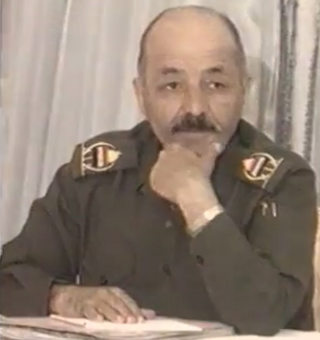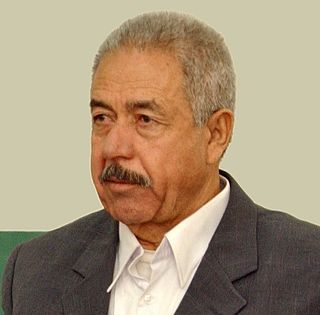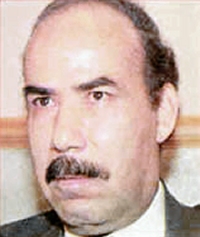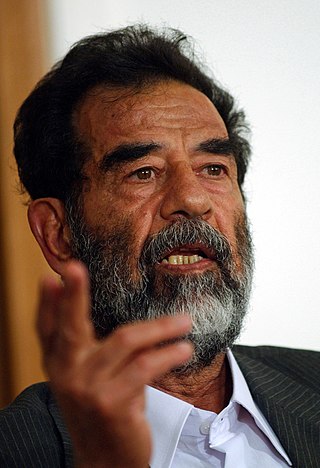Related Research Articles

Tariq Aziz was an Iraqi politician who served as Deputy Prime Minister, Minister of Foreign Affairs and a close advisor of President Saddam Hussein. Their association began in the 1950s when both were activists for the then-banned Arab Socialist Ba'ath Party. He was both an Arab nationalist and a member of the Chaldean Catholic Church.

Taha Yasin Ramadan al-Jizrawi was an Iraqi politician and military officer of Kurdish origin, who served as one of the three vice presidents of Iraq from March 1991 to the fall of Saddam Hussein in April 2003.

Ali Hassan Majid al-Tikriti, nicknamed Chemical Ali, was an Iraqi politician and military commander under Saddam Hussein who served as defence minister, interior minister, and chief of the Iraqi Intelligence Service. He was also the governor of Kuwait during much of the 1990–91 Gulf War.

Barzan Ibrahim Hassan al-Tikriti, also known as Barazan Ibrahim al-Tikriti, Barasan Ibrahem Alhassen and Barzan Hassan, was one of three half-brothers of Saddam Hussein, and a leader of the Mukhabarat, the Iraqi intelligence service. Despite falling out of favour with Saddam at one time, he was believed to have been a close presidential adviser at the time of his capture by U.S. forces. On 15 January 2007, Barzan was hanged for crimes against humanity. He was decapitated by the hangman's rope after errors were made calculating his body weight and length of drop from the platform.
The Iraqi High Tribunal (IHT), formerly the Iraqi Special Tribunal and sometimes referred to as the Supreme Iraqi Criminal Tribunal, is a body established under Iraqi national law to try Iraqi nationals or residents accused of genocide, crimes against humanity, war crimes or other serious crimes committed between 1968 and 2003. It organized the trial of Saddam Hussein and other members of his Ba'ath Party regime.

The Anfal campaign was a counterinsurgency operation which was carried out by Ba'athist Iraq from February to September 1988, at the end of the Iran–Iraq War. The campaign targeted rural Kurds because its purpose was to eliminate Kurdish rebel groups and Arabize strategic parts of the Kirkuk Governorate.
Dujail is a town in Saladin Governorate, Iraq. It is situated about 65 kilometers (40 mi) north of Baghdad, and has approximately 100,000 inhabitants, who are mostly Shia. It was the site of the 1982 Dujail Massacre, in which between 142 and 148 people, including children, died. The 2008 Dujail bombing also took place here, and many bombings during the separate years and withstood during the terrorist attack of ISIS. It is famous for its palms and grapes, and it is considered a beautiful agricultural land.

The trial of Saddam Hussein was the trial of the deposed President of Iraq Saddam Hussein by the Iraqi Interim Government for crimes against humanity during his time in office.

Awad Hamad al-Bandar (Arabic: عواد حمد البندر السعدون, romanized: ʿAwād Ḥamad al-Bandar al-Saʿdūn; was an Iraqi chief judge under Saddam Hussein's presidency. He was a member of the Arab Socialist Ba'ath Party and was the head of the Revolutionary Court which issued death sentences against 143 Dujail residents, in the aftermath of the failed assassination attempt on the president on 8 July 1982.

Rizgar Mohammed Amin is the former chief judge of the Iraqi Special Tribunal's Al-Dujail trial. He is the only judge whose name was revealed on the trial's opening on 19 October 2005, the names of the other four judges and all but two of his four colleagues faces not allowed to be shown during the televised portions of the trial.(Telegraph.co.uk - 12:30AM GMT 15 January 2006)
Mizhar Abdullah Ruaid is a former Arab Socialist Ba'ath Party official in the Dujail region of Iraq, and the son of Abdullah Kadhem Ruaid. He was arrested in 2005 by US Forces while still living in Dujail. The arresting unit was the A/1-128 Infantry of the Wisconsin Army National Guard. He was convicted of involvement in the killings of 148 Shia Muslims during the Al-Dujail trial of Saddam Hussein, and was sentenced to 15 years in prison for aiding and abetting crimes against humanity. Ruaid has since completed his sentence.
Abdullah Kadhem Ruaid was a former Arab Socialist Ba'ath Party official in the Dujail region of Iraq and the father of Mizher Abdullah Roweed Al-Musheikhi. He was arrested in 2005 by A/1-128 of the Wisconsin Army National Guard. Ruaid was convicted of involvement in the killings of 148 Shia Muslims during the Al-Dujail trial of Saddam Hussein, and sentenced to 15 years in prison for aiding and abetting crimes against humanity.

Rauf Rashid Abd al-Rahman is the replacement chief judge of the Al-Dujail trial of Saddam Hussein in 2006, when he sentenced Saddam and some of his top aides to death by hanging.
Capital punishment in Iraq is a legal penalty. It was commonly used by the government of Saddam Hussein, was temporarily halted after the US-led 2003 invasion of Iraq that deposed Saddam, and has since been reinstated. Executions are carried out by hanging.

The execution of former Iraqi President Saddam Hussein took place on 30 December 2006. Saddam Hussein was sentenced to death by hanging, after being convicted of crimes against humanity by the Iraqi Special Tribunal for the Dujail massacre—the killing of 148 Iraqi Shi'ites in the town of Dujail—in 1982, in retaliation for an assassination attempt against him.

Giovanni Di Stefano is an Italian businessman and convicted fraudster. He has been involved in legal cases for high-profile notorious defendants worldwide. He has no legal qualifications, is barred from working in law in the UK, and is not registered to work as an advocate in the UK or Italy. He has been referred to as "The Devil's Advocate" for his advocacy on behalf of such notorious clients as Saddam Hussein and Slobodan Milošević. He was also a business associate of Željko Ražnatović, a Serbian paramilitary leader and indicted war criminal.
The Dujail massacre was a mass killing of Shia rebels by the Ba'athist Iraqi government on 8 July 1982 in Dujail, Iraq. The massacre was committed in retaliation to an earlier assassination attempt by the Shia Iranian supported Islamic Dawa Party against the then President of Iraq, Saddam Hussein. The town of Dujail had a large Shia population, with 75,000 residents at the time of the incident, and was a well-known stronghold of the Dawa Party. It is located approximately 53 km (33 mi) from the capital of Baghdad, in the Sunni-majority Saladin Governorate of Iraq.

House of Saddam is a 2008 British docudrama television miniseries that charted the rise and fall of Saddam Hussein. A co-production between BBC Television and HBO Films, the series was first broadcast on BBC Two in four parts between 30 July and 20 August 2008.
Najeeb Al Nuaimi is a Qatari lawyer and human rights activist. He is a former cabinet minister of Qatar, having served as the Minister of Justice from 1995 to 1997. He previously taught public law at Qatar University.
Reactions to the execution of Saddam Hussein were varied. Some strongly supported the execution, particularly those personally affected by Saddam's actions as leader. Some of these victims wished to see him brought to trial for his other actions, alleged to have resulted in a much greater number of deaths than those for which he was convicted. Some believed the execution would boost morale in Iraq, while others feared it would incite further violence. Many in the international community supported Saddam being brought to justice but objected in particular to the use of capital punishment. Saddam's supporters condemned the action as unjust.
References
- ↑ "Saddam trial: Verdicts in detail". BBC News. 5 November 2006. Retrieved 11 February 2010.
- ↑ Bhuta, Nehal. "Fatal Errors: The Trial and Appeal Judgments in the Dujail Case" . Retrieved 2023-07-06.